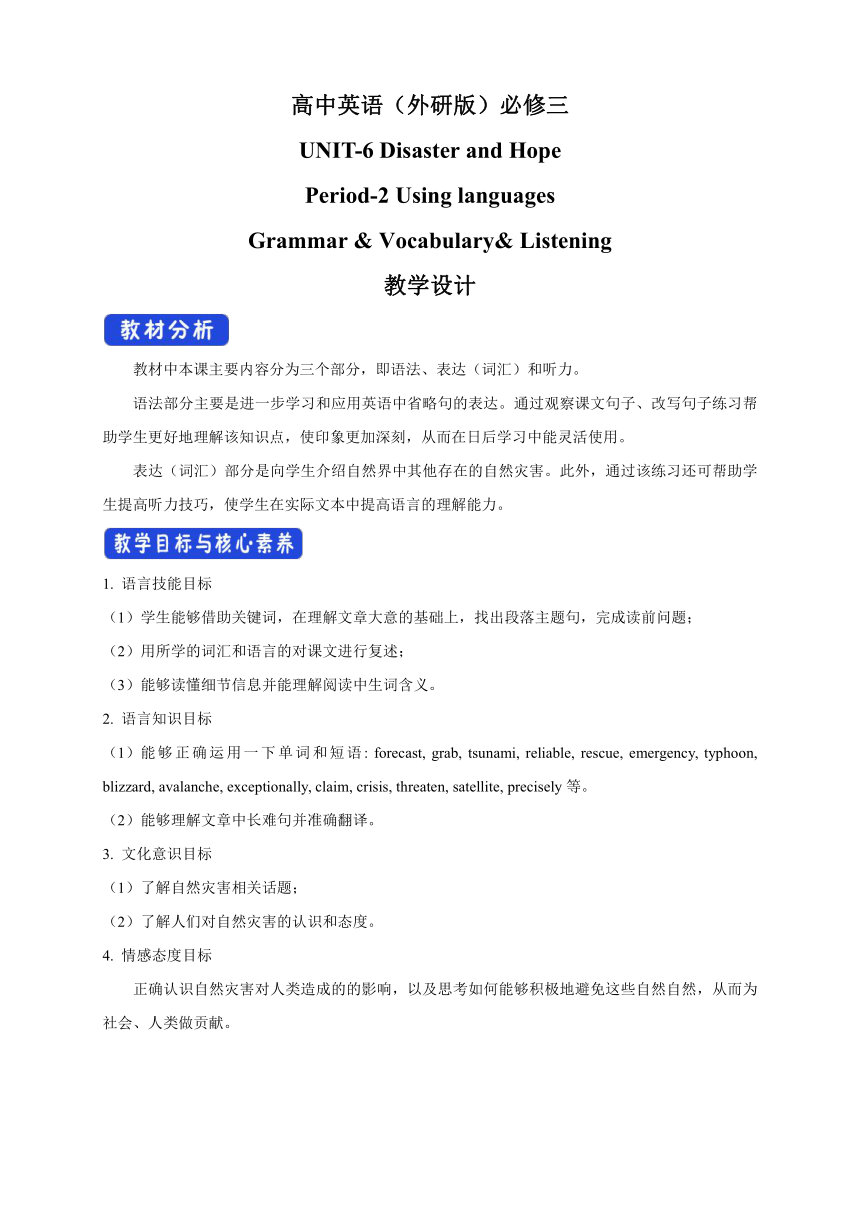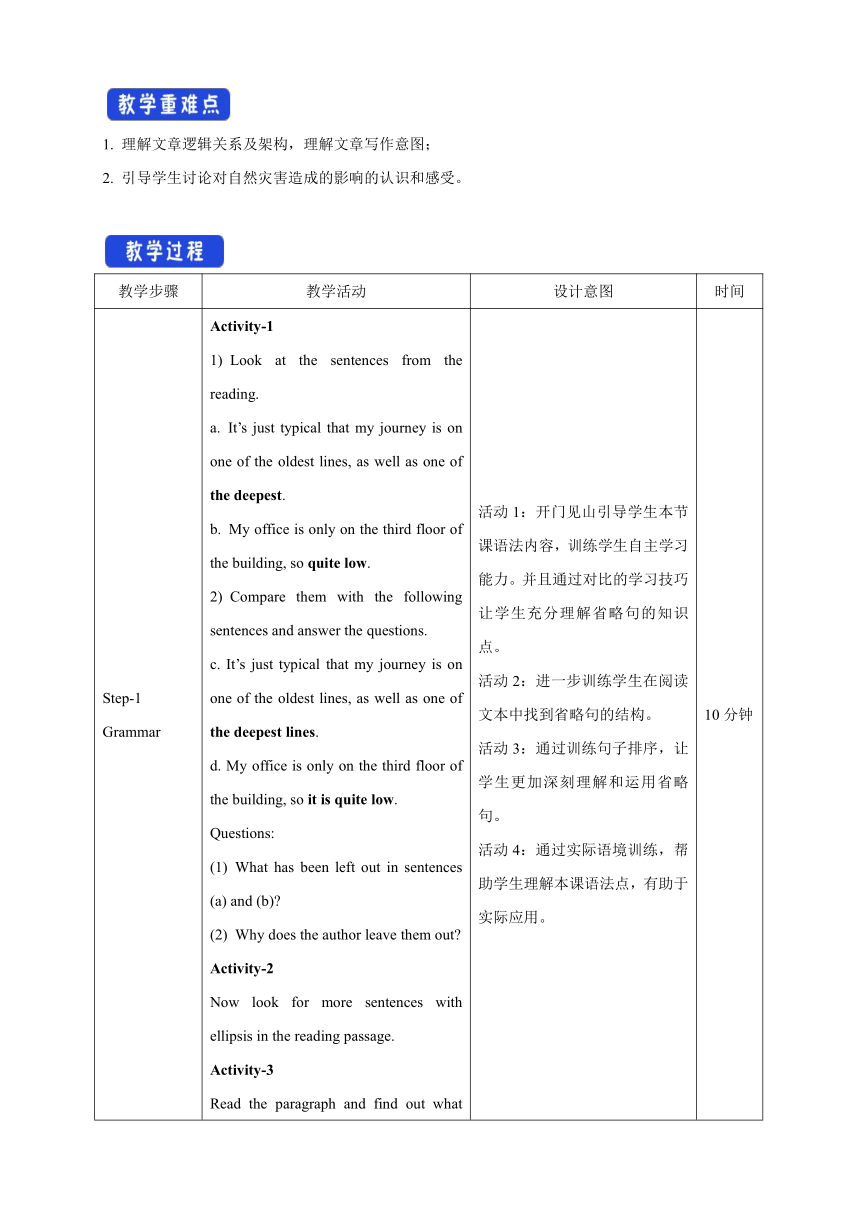外研版(2019) 必修第三册 Unit 6 Disaster and hopeUsing languages 教学设计(2)
文档属性
| 名称 | 外研版(2019) 必修第三册 Unit 6 Disaster and hopeUsing languages 教学设计(2) |  | |
| 格式 | zip | ||
| 文件大小 | 43.1KB | ||
| 资源类型 | 教案 | ||
| 版本资源 | 外研版(2019) | ||
| 科目 | 英语 | ||
| 更新时间 | 2022-08-25 18:49:35 | ||
图片预览


文档简介
高中英语(外研版)必修三
UNIT-6 Disaster and Hope
Period-2 Using languages
Grammar & Vocabulary& Listening
教学设计
教材中本课主要内容分为三个部分,即语法、表达(词汇)和听力。
语法部分主要是进一步学习和应用英语中省略句的表达。通过观察课文句子、改写句子练习帮助学生更好地理解该知识点,使印象更加深刻,从而在日后学习中能灵活使用。
表达(词汇)部分是向学生介绍自然界中其他存在的自然灾害。此外,通过该练习还可帮助学生提高听力技巧,使学生在实际文本中提高语言的理解能力。
语言技能目标
学生能够借助关键词,在理解文章大意的基础上,找出段落主题句,完成读前问题;
用所学的词汇和语言的对课文进行复述;
能够读懂细节信息并能理解阅读中生词含义。
语言知识目标
能够正确运用一下单词和短语: forecast, grab, tsunami, reliable, rescue, emergency, typhoon, blizzard, avalanche, exceptionally, claim, crisis, threaten, satellite, precisely等。
能够理解文章中长难句并准确翻译。
文化意识目标
了解自然灾害相关话题;
了解人们对自然灾害的认识和态度。
情感态度目标
正确认识自然灾害对人类造成的的影响,以及思考如何能够积极地避免这些自然自然,从而为社会、人类做贡献。
理解文章逻辑关系及架构,理解文章写作意图;
引导学生讨论对自然灾害造成的影响的认识和感受。
教学步骤 教学活动 设计意图 时间
Step-1 Grammar Activity-1 Look at the sentences from the reading. It’s just typical that my journey is on one of the oldest lines, as well as one of the deepest. My office is only on the third floor of the building, so quite pare them with the following sentences and answer the questions. c. It’s just typical that my journey is on one of the oldest lines, as well as one of the deepest lines. d. My office is only on the third floor of the building, so it is quite low. Questions: What has been left out in sentences (a) and (b) Why does the author leave them out Activity-2 Now look for more sentences with ellipsis in the reading passage. Activity-3 Read the paragraph and find out what words have been removed before or after the underlined words. Activity-4 Remove words from the news report to make it more concise. 活动1:开门见山引导学生本节课语法内容,训练学生自主学习能力。并且通过对比的学习技巧让学生充分理解省略句的知识点。 活动2:进一步训练学生在阅读文本中找到省略句的结构。 活动3:通过训练句子排序,让学生更加深刻理解和运用省略句。 活动4:通过实际语境训练,帮助学生理解本课语法点,有助于实际应用。 10分钟
Step-2 Vocabulary Activity-1 Look at the pictures and answer the questions. Which one do you think is the most dangerous Can you name some big natural disasters in history Activity-2 Complete the reports with the words in last activity. Pay attention to the words describing natural disasters. Activity-3 Work in pairs. Talk about a recent natural disaster you have heard about or seen on the news. 活动1:帮助学生提高自主学习能力,以便更好地掌握单词和短语。 活动2:训练学生于实际文中运用本课新词,使其印象深刻,便于记忆和准确适用单词。 活动3:通过设置情景,锻炼学生口语表达能力,同时也再次使学生对本课单词、词组加深印象,更流利地使用。 10分钟
Step-3 Listening Pre-listening Read “Did You Know” and learn more information about extreme weather conditions. Look at the “Learning to learn” and get some skills. While-listening Listen to the the weather forecast and match the weather symbols to the locations on the map. Deep-listening Listen again and complete the form. Now talk about how the speaker describes the weather. Listen again if necessary. Post-listening Work in pairs. Act out the conversation to talk about an extreme weather condition. Choose another extreme weather condition and have a similar conversation. 通过泛听、精听多层次听力训练,能够让学生对听力材料有初步了解,锻炼学生对文章表层含义理解,养成良好的听力习惯,提高听力技能。并且帮助学生组织语言回答听前、听后问题。 15分钟
Step-4 Language points 1. It is also said that mice and snakes head for safer ground several days before an earthquake, while dogs avoiding the beach may be a sign that a tsunami is approaching. [句式分析] 本句有三处语言点需要掌握。①词组head for译为“朝…去”,此处head是动词,for后加目的地。②非谓语动词avoiding作dogs的定语,主动关系用现在分词。③that引导同位语从句,解释说明sign的内容。 [尝试翻译] 据说,地震前几天老鼠和蛇会前往更安全的地方;而狗躲避海滩可能是海啸来临的迹象。 2. On hearing the news, China was quick to start organising emergency aid. [句式分析] 本句的on hearing the news可译为“一听到这个消息”,词组on+doing sth表示“一……就”,与“as soon as, the immediately”有类似意思。 [尝试翻译] 一听到这个消息,中国就迅速开始组织紧急援助。 10分钟
Step-5 Homework - Review new words and phrases learned in this period. - Surf the Internet to find more expressions about extreme weather conditions.
UNIT-6 Disaster and Hope
Period-2 Using languages
Grammar & Vocabulary& Listening
教学设计
教材中本课主要内容分为三个部分,即语法、表达(词汇)和听力。
语法部分主要是进一步学习和应用英语中省略句的表达。通过观察课文句子、改写句子练习帮助学生更好地理解该知识点,使印象更加深刻,从而在日后学习中能灵活使用。
表达(词汇)部分是向学生介绍自然界中其他存在的自然灾害。此外,通过该练习还可帮助学生提高听力技巧,使学生在实际文本中提高语言的理解能力。
语言技能目标
学生能够借助关键词,在理解文章大意的基础上,找出段落主题句,完成读前问题;
用所学的词汇和语言的对课文进行复述;
能够读懂细节信息并能理解阅读中生词含义。
语言知识目标
能够正确运用一下单词和短语: forecast, grab, tsunami, reliable, rescue, emergency, typhoon, blizzard, avalanche, exceptionally, claim, crisis, threaten, satellite, precisely等。
能够理解文章中长难句并准确翻译。
文化意识目标
了解自然灾害相关话题;
了解人们对自然灾害的认识和态度。
情感态度目标
正确认识自然灾害对人类造成的的影响,以及思考如何能够积极地避免这些自然自然,从而为社会、人类做贡献。
理解文章逻辑关系及架构,理解文章写作意图;
引导学生讨论对自然灾害造成的影响的认识和感受。
教学步骤 教学活动 设计意图 时间
Step-1 Grammar Activity-1 Look at the sentences from the reading. It’s just typical that my journey is on one of the oldest lines, as well as one of the deepest. My office is only on the third floor of the building, so quite pare them with the following sentences and answer the questions. c. It’s just typical that my journey is on one of the oldest lines, as well as one of the deepest lines. d. My office is only on the third floor of the building, so it is quite low. Questions: What has been left out in sentences (a) and (b) Why does the author leave them out Activity-2 Now look for more sentences with ellipsis in the reading passage. Activity-3 Read the paragraph and find out what words have been removed before or after the underlined words. Activity-4 Remove words from the news report to make it more concise. 活动1:开门见山引导学生本节课语法内容,训练学生自主学习能力。并且通过对比的学习技巧让学生充分理解省略句的知识点。 活动2:进一步训练学生在阅读文本中找到省略句的结构。 活动3:通过训练句子排序,让学生更加深刻理解和运用省略句。 活动4:通过实际语境训练,帮助学生理解本课语法点,有助于实际应用。 10分钟
Step-2 Vocabulary Activity-1 Look at the pictures and answer the questions. Which one do you think is the most dangerous Can you name some big natural disasters in history Activity-2 Complete the reports with the words in last activity. Pay attention to the words describing natural disasters. Activity-3 Work in pairs. Talk about a recent natural disaster you have heard about or seen on the news. 活动1:帮助学生提高自主学习能力,以便更好地掌握单词和短语。 活动2:训练学生于实际文中运用本课新词,使其印象深刻,便于记忆和准确适用单词。 活动3:通过设置情景,锻炼学生口语表达能力,同时也再次使学生对本课单词、词组加深印象,更流利地使用。 10分钟
Step-3 Listening Pre-listening Read “Did You Know” and learn more information about extreme weather conditions. Look at the “Learning to learn” and get some skills. While-listening Listen to the the weather forecast and match the weather symbols to the locations on the map. Deep-listening Listen again and complete the form. Now talk about how the speaker describes the weather. Listen again if necessary. Post-listening Work in pairs. Act out the conversation to talk about an extreme weather condition. Choose another extreme weather condition and have a similar conversation. 通过泛听、精听多层次听力训练,能够让学生对听力材料有初步了解,锻炼学生对文章表层含义理解,养成良好的听力习惯,提高听力技能。并且帮助学生组织语言回答听前、听后问题。 15分钟
Step-4 Language points 1. It is also said that mice and snakes head for safer ground several days before an earthquake, while dogs avoiding the beach may be a sign that a tsunami is approaching. [句式分析] 本句有三处语言点需要掌握。①词组head for译为“朝…去”,此处head是动词,for后加目的地。②非谓语动词avoiding作dogs的定语,主动关系用现在分词。③that引导同位语从句,解释说明sign的内容。 [尝试翻译] 据说,地震前几天老鼠和蛇会前往更安全的地方;而狗躲避海滩可能是海啸来临的迹象。 2. On hearing the news, China was quick to start organising emergency aid. [句式分析] 本句的on hearing the news可译为“一听到这个消息”,词组on+doing sth表示“一……就”,与“as soon as, the immediately”有类似意思。 [尝试翻译] 一听到这个消息,中国就迅速开始组织紧急援助。 10分钟
Step-5 Homework - Review new words and phrases learned in this period. - Surf the Internet to find more expressions about extreme weather conditions.
